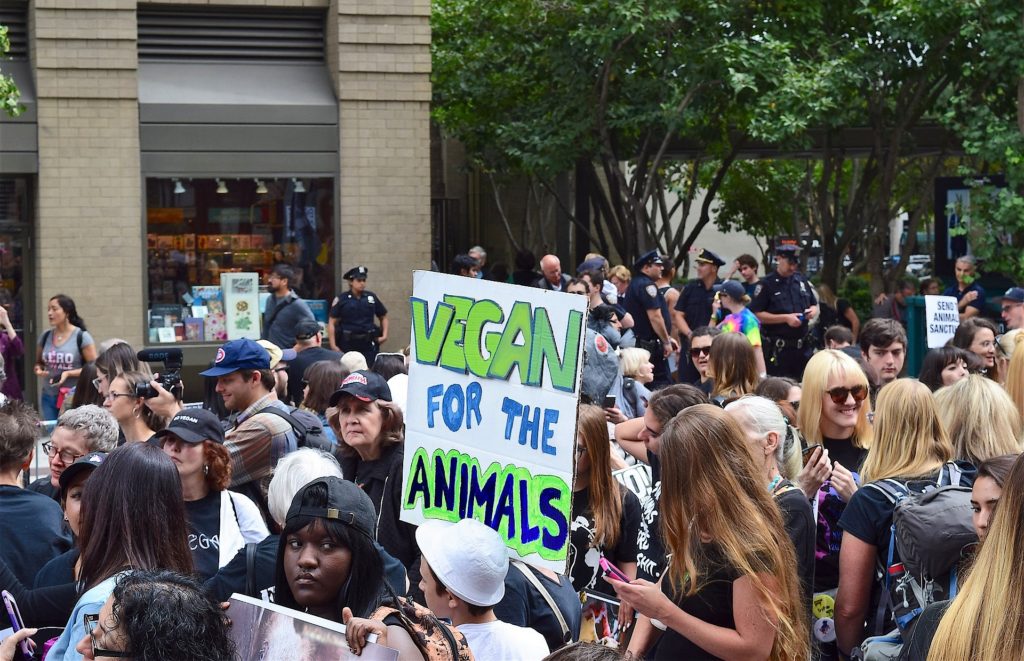Professor Robert Garner, lecturer of political theory at the University of Leicester, considers how the objectives of animal advocates might be politically implemented within contemporary society.
 Many animal advocates have spent a great deal of time talking and thinking about how we should treat animals. By contrast, they haven’t spent as much time engaging with how their desired objectives are going to be achieved. This latter task necessitates thinking about democracy, since democracy is almost universally regarded as the most just and fair way to make collective decisions binding on individuals.
Many animal advocates have spent a great deal of time talking and thinking about how we should treat animals. By contrast, they haven’t spent as much time engaging with how their desired objectives are going to be achieved. This latter task necessitates thinking about democracy, since democracy is almost universally regarded as the most just and fair way to make collective decisions binding on individuals.
Democracy, as it is presently constituted amounts to a counting exercise. That is, after a free and fair debate, the outcome which gets the most support is the one that is translated into a law or a regulation. The problem for animal advocates is that this means they will often be unhappy with the outcome of a democratic vote. That is, the relationship between democracy and the achievement of more stringent protection for animals is a contingent one. It might be that concern for animals is widespread, and that this concern is reflected in the decisions made. More likely, though, animal advocates are going to be frustrated at the lack of interest their fellow citizens have in ensuring the well-being of animals.
 So, what should the response of animal advocates be to this contingent relationship between democracy and animal protection? The obvious response is to simply say that this is the price that has to be paid for living in a democracy. If we lose a battle, we get up, brush ourselves down, and try again.
So, what should the response of animal advocates be to this contingent relationship between democracy and animal protection? The obvious response is to simply say that this is the price that has to be paid for living in a democracy. If we lose a battle, we get up, brush ourselves down, and try again.
It is easy to see why many advocates of animal rights are unlikely to accept this. Imagine that there was a referendum in which the electorate voted by a majority to support the use of humans with red hair in, sometimes painful, scientific experiments. Obviously, there would be a major outcry at the very prospect of holding such a referendum, on the grounds that it involves the infringement of basic human rights. For someone who holds that animals, too, possess basic rights, it is similarly not acceptable for these rights to be overturned by a democratic vote. In many political systems across the world, basic human rights are protected against democratic majoritarianism. The same could be envisaged for the rights of animals.
I suspect many animal advocates would, at this point, challenge the democratic credentials of our political system in any case. Few animal advocates think, for whatever reason, that their views are adequately represented in the political process. They may have a good case too. Sometimes, majority support for a measure protecting animals is translated into legislative protection, as was the case with fox hunting. More often than not, though, the political power of those, usually economic, interests with a vested interest in the continued exploitation of animals is a clear obstacle to the fair and effective representation of the views of those with an interest in the protection of animals.
 Given the suspicion that those concerned about the well-being of animals are not given a fair hearing in the political process, whatever democratic rhetoric proclaims, we might focus on reforms that would make the protection of animal interests more likely.
Given the suspicion that those concerned about the well-being of animals are not given a fair hearing in the political process, whatever democratic rhetoric proclaims, we might focus on reforms that would make the protection of animal interests more likely.
I suggest two such reforms here. The first is a radical step. Consider again the referendum that I mentioned above. Leaving aside the monstrous nature of the proposal being voted on, it can at least be said that those with red hair get a say in the decision. By contrast, humans make life and death decisions about animals, and yet there is no procedure whereby the interests of animals are represented in the political process. Isn’t this a flaw in our political system? Indeed, doesn’t it reveal a democratic deficit?
The second, and perhaps more realistic, reform proposal revolves around the promotion of deliberation. What we have now is a form of aggregative democracy. What elections or public opinion polls do is to measure pre-existing preferences. The problem with this, however, is no attention is given to the way in which preferences are arrived at in the first place.
It goes without saying that most of the ‘debates’ about animal use are not of the deliberative kind. They are usually structured in a way that favours the interests of those with a vested interest in continuing to exploit animals. Likewise, resources are often unequally distributed in debates about animals. The high status of science and scientists, for instance, is always likely to skew a debate in favour of animal research. Most debates about animal exploitation are also adversarial, degenerating into slanging matches where there is more heat than light on display, and where pre-existing preferences are rarely challenged.
 A deliberative model of democracy offers an alternative. This model holds that the outcome of a debate is only legitimate if it is a product of reasoned and detailed discussion. What matters is the quality of debate. In deliberative forums all points of view are represented, an equal chance to participate is offered to all of those who are present, and detailed, comprehensive and accurate information is available to the participants.
A deliberative model of democracy offers an alternative. This model holds that the outcome of a debate is only legitimate if it is a product of reasoned and detailed discussion. What matters is the quality of debate. In deliberative forums all points of view are represented, an equal chance to participate is offered to all of those who are present, and detailed, comprehensive and accurate information is available to the participants.
I would suggest that a deliberative form of democracy is more likely to produce outcomes that animal advocates want. Its outcomes are likely to be more informed, and ultimately more just. The economic interests of those who exploit animals will be less influential. If animal advocates are convinced that their case is right, then they should have nothing to fear from a genuinely deliberative debate. Deliberation increases the possibility that existing preferences will be challenged and even transformed.
Robert Garner is professor of political theory at the University of Leicester. He specialises in animal rights, focusing on animal protectionism and the political representation of non-human interests.




